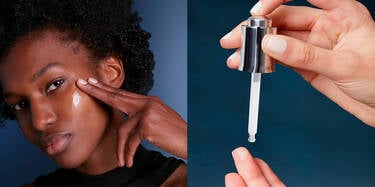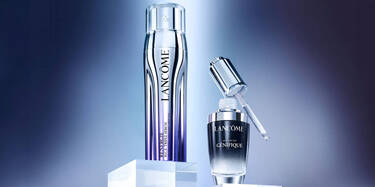What is a Skin Barrier? Understanding and Caring for Your Skin’s Protective Shield

Healthy, radiant skin relies on one crucial element: the skin barrier. This often-overlooked skincare aspect is vital in maintaining the skin’s health and appearance. If you’ve ever dealt with dryness, irritation, or other skin issues, your skin barrier might be the culprit. In this comprehensive guide, we’ll delve into what skin barrier is, its purpose, signs of damaged skin barrier and how to repair damaged skin effectively.
What is a Skin Barrier?
The skin barrier, also known as the stratum corneum, is the outermost layer of the skin. It is composed of tightly
packed cells called corneocytes and lipids (fats), which include ceramides, cholesterol, and fatty acids. This layer
acts as a protective shield, safeguarding the skin from environmental stressors, and irritants while retaining
moisture and essential nutrients.
The skin barrier functions like a brick wall: the corneocytes (bricks) are held together by lipids. This structure
ensures the skin remains resilient and capable of performing its protective duties effectively.
Purpose of Skin Barrier
1. Protection from External Aggressors
The primary purpose of the skin barrier is to protect the body from external aggressors such as pollutants, UV radiation, bacteria, and allergens. It acts as the first line of defence, preventing harmful substances from penetrating deeper into the skin and causing damage or infections.
2. Prevention of Water Loss
A well-functioning skin barrier prevents the process of water evaporating from the skin’s surface. By retaining moisture, the skin barrier keeps the skin hydrated, plump, and less prone to dryness and irritation.
3. Maintaining Skin’s Natural pH Balance
The skin barrier helps maintain the skin’s natural pH balance, which is slightly acidic (around 4.7 to 5.5). This acidity is crucial for inhibiting the growth of harmful bacteria and supporting the skin’s microbiome, the community of beneficial microorganisms living on the skin.
4. Facilitating Skin Repair and Renewal
The skin barrier plays a role in the skin’s natural repair and renewal processes. It helps regulate the shedding of dead skin cells and the regeneration of new ones, ensuring the skin remains smooth and resilient.
5. Regulating Temperature
The skin barrier also plays a role in regulating the skin's temperature. By controlling the amount of water loss and retention, it helps keep the skin's surface temperature stable, which is essential for overall skin health and function.
Signs Of Damaged Skin Barrier
A damaged skin barrier can lead to a host of skin issues, making it essential to recognise the signs early on. Common indicators of compromised skin barrier include:
1. Dryness and Flakiness
One of the most noticeable signs of a damaged skin barrier is persistent dryness and flakiness. When the barrier is compromised, it loses its ability to retain moisture, leading to dehydrated skin that feels rough and tight.
2. Redness and Irritation
A weakened skin barrier can result in increased sensitivity, causing redness, inflammation, and irritation. You might notice your skin reacts more strongly to products or environmental factors that previously didn’t cause any issues.
3. Itching and Discomfort
Damaged skin is often itchy and uncomfortable. The lack of proper hydration and protection makes the skin more susceptible to irritants, leading to an itchy sensation that can be hard to ignore.
4. Breakouts and Infections
When the skin barrier is compromised, its ability to defend against bacteria is reduced. This can increase breakouts, as well as a higher risk of infections and skin conditions such as eczema or dermatitis.
5. Increased Sensitivity
If your skin becomes more sensitive than usual, reacting to even mild products or changes in the environment, it’s a clear sign that your skin barrier is damaged and needs attention.
How to Repair the Skin Barrier?
Repairing and strengthening the skin barrier involves a combination of gentle skincare practices and the use of barrier-boosting ingredients. Here’s how you can restore your skin’s protective shield:
1. Use Gentle Cleansers
Harsh cleansers can strip the skin of its natural oils and damage the skin barrier. Opt for mild, hydrating cleansers that gently exfoliate the skin without disrupting its natural lipid balance. Look for sulphate-free formulas with soothing ingredients to maintain skin health.
2. Incorporate Barrier-Boosting Ingredients
Certain ingredients are known for their ability to repair and strengthen the skin barrier. These include:
- Hyaluronic Acid : Provides deep hydration, helping to plump and soothe the skin
- Ceramides : Help restore the lipid matrix, enhancing the skin’s ability to retain moisture
- Niacinamide (Vitamin B3) : Reduces inflammation, improves elasticity, and strengthens the barrier
Pro Tip: Try the hyaluronic acid serum that strengthens and repairs the skin barrier instantly. Formulated with pre- & probiotic fractions, Hyaluronic Acid, and Vitamin CG this serum helps improve skin quality, boosts radiance and visibly reduces the appearance of fine lines and wrinkles. It allows your skin to be better equipped to face external stressors such as pollution, dry weather, humidity and more that can lead to faster ageing.
3. Moisturise Regularly
Keeping your skin well-moisturised is crucial for barrier repair. Choose a soothing and hydrating moisturiser rich in emollients, which help lock in moisture and create a protective barrier on the skin’s surface.
4. Avoid Over-Exfoliation
While exfoliation is important for removing dead skin cells, over-exfoliating can damage the skin barrier. Limit the use of physical exfoliants and opt for gentle exfoliating gel cleansers. Ensure you exfoliate no more than once or twice a week, depending on your skin’s tolerance.
5. Protect Your Skin from Environmental Stressors
Shield your skin from environmental stressors by applying broad-spectrum sunscreen daily, even on cloudy days. Sunscreen protects the skin from UV damage, which can weaken the barrier and lead to premature ageing.
6. Stay Hydrated
Hydration is key to maintaining a healthy skin barrier. Drink plenty of water throughout the day to keep your skin hydrated from the inside out. Consuming foods rich in omega-3 fatty acids, such as salmon, walnuts, and flaxseeds, can also support skin hydration and barrier function.
7. Be Mindful of Your Skincare Routine
Simplify your skincare routine to avoid overwhelming your skin with too many products. Stick to a basic skincare
regimen that includes cleansing, hydrating, moisturising, and sun protection. Introduce new products gradually and
pay attention to how your skin reacts.
The skin barrier is an essential component of healthy skin, serving as a protective shield against environmental
aggressors and preventing moisture loss. Recognising the signs of a damaged skin barrier and taking steps to repair
and strengthen it can lead to significant improvements in your skin’s health and appearance. By incorporating gentle
skincare practices and barrier-boosting ingredients into your routine, you can ensure your skin remains resilient,
hydrated, and radiant. Browse through a wide range of Lancôme’s skincare products, prioritise your skin barrier, and
you’ll be rewarded with glowing skin that’s ready to face the world.














.jpg?sw=375&sh=211&sm=cut&q=70)

